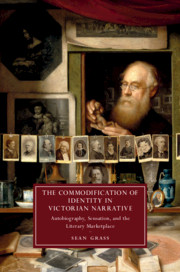 The Commodification of Identity in Victorian Narrative
The Commodification of Identity in Victorian Narrative Book contents
- The Commodification of Identity in Victorian Narrative
- Cambridge Studies in Nineteenth-century Literature and Culture
- The Commodification of Identity in Victorian Narrative
- Copyright page
- Dedication
- Contents
- Figures
- Acknowledgments
- Introduction Life Upon the Exchange: Commodifying the Victorian Subject
- Chapter 1 “A Vile Symptom”: Autobiography and the Commodification of Identity
- Chapter 2 “Portable Property”: Commodity and Identity in Great Expectations
- Chapter 3 Lady Audley’s Portrait: Textuality, Gender, and Power
- Chapter 4 Amnesia, Madness, and Financial Fraud: Ontologies of Loss in Silas Marner and Hard Cash
- Chapter 5 “What Money Can Make of Life”: Willing Subjects and Commodity Culture in Our Mutual Friend
- Chapter 6 The Moonstone, Sacred Identity, and the Material Self
- Conclusion Money Made of Life: The Tichborne Claimant
- Appendix
- Notes
- Works Cited
- Index
- Cambridge Studies in Nineteenth-Century Literature and Culture
Chapter 4 - Amnesia, Madness, and Financial Fraud: Ontologies of Loss in Silas Marner and Hard Cash
Published online by Cambridge University Press: 24 October 2019
- The Commodification of Identity in Victorian Narrative
- Cambridge Studies in Nineteenth-century Literature and Culture
- The Commodification of Identity in Victorian Narrative
- Copyright page
- Dedication
- Contents
- Figures
- Acknowledgments
- Introduction Life Upon the Exchange: Commodifying the Victorian Subject
- Chapter 1 “A Vile Symptom”: Autobiography and the Commodification of Identity
- Chapter 2 “Portable Property”: Commodity and Identity in Great Expectations
- Chapter 3 Lady Audley’s Portrait: Textuality, Gender, and Power
- Chapter 4 Amnesia, Madness, and Financial Fraud: Ontologies of Loss in Silas Marner and Hard Cash
- Chapter 5 “What Money Can Make of Life”: Willing Subjects and Commodity Culture in Our Mutual Friend
- Chapter 6 The Moonstone, Sacred Identity, and the Material Self
- Conclusion Money Made of Life: The Tichborne Claimant
- Appendix
- Notes
- Works Cited
- Index
- Cambridge Studies in Nineteenth-Century Literature and Culture
Summary
Charles Reade was laboring over the early numbers of Very Hard Cash in July 1862 when he found the first installment of George Eliot’s Romola in the Cornhill. He reached two immediate conclusions about her new novel: first, that he could “see no trace of George Eliot in the story,” though the Cornhill had advertised the work as hers; and second, that she must have founded Romola upon his own novel of Renaissance Italy, The Cloister and the Hearth (1861), which had succeeded critically and commercially the prior year. “Is it egotism,” he wrote to his friend Laura Seymour, “or am I right in thinking that this story of the fifteenth century has been called into existence by my success with the same epoch? If it is Georgy Porgy, why then Lewes has been helping her! All the worse for her. The grey mare is the better horse.”
- Type
- Chapter
- Information
- The Commodification of Identity in Victorian NarrativeAutobiography, Sensation, and the Literary Marketplace, pp. 126 - 160Publisher: Cambridge University PressPrint publication year: 2019


